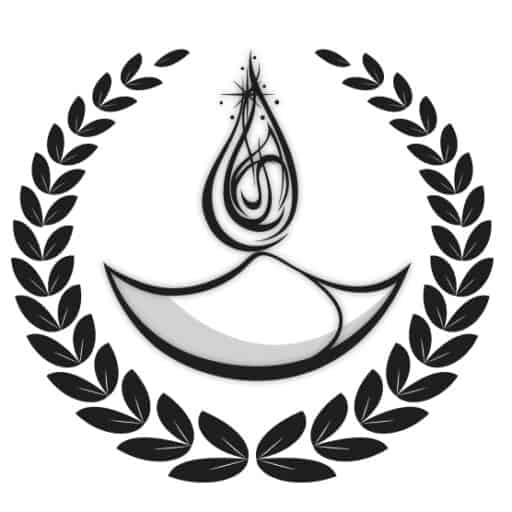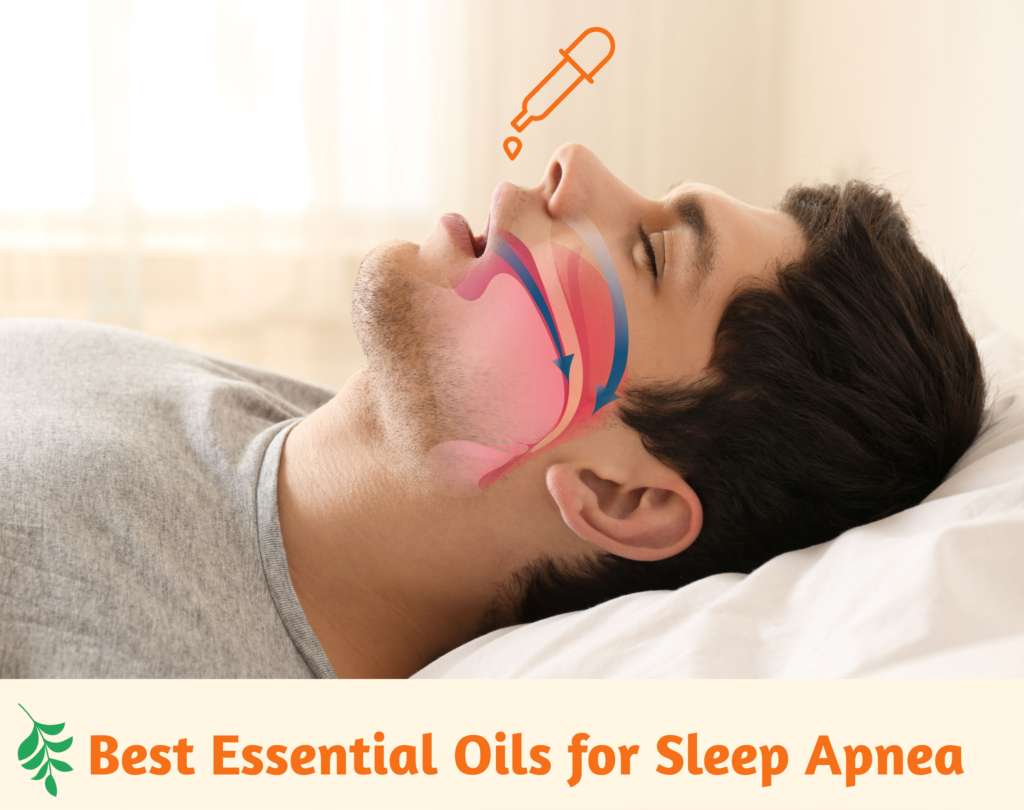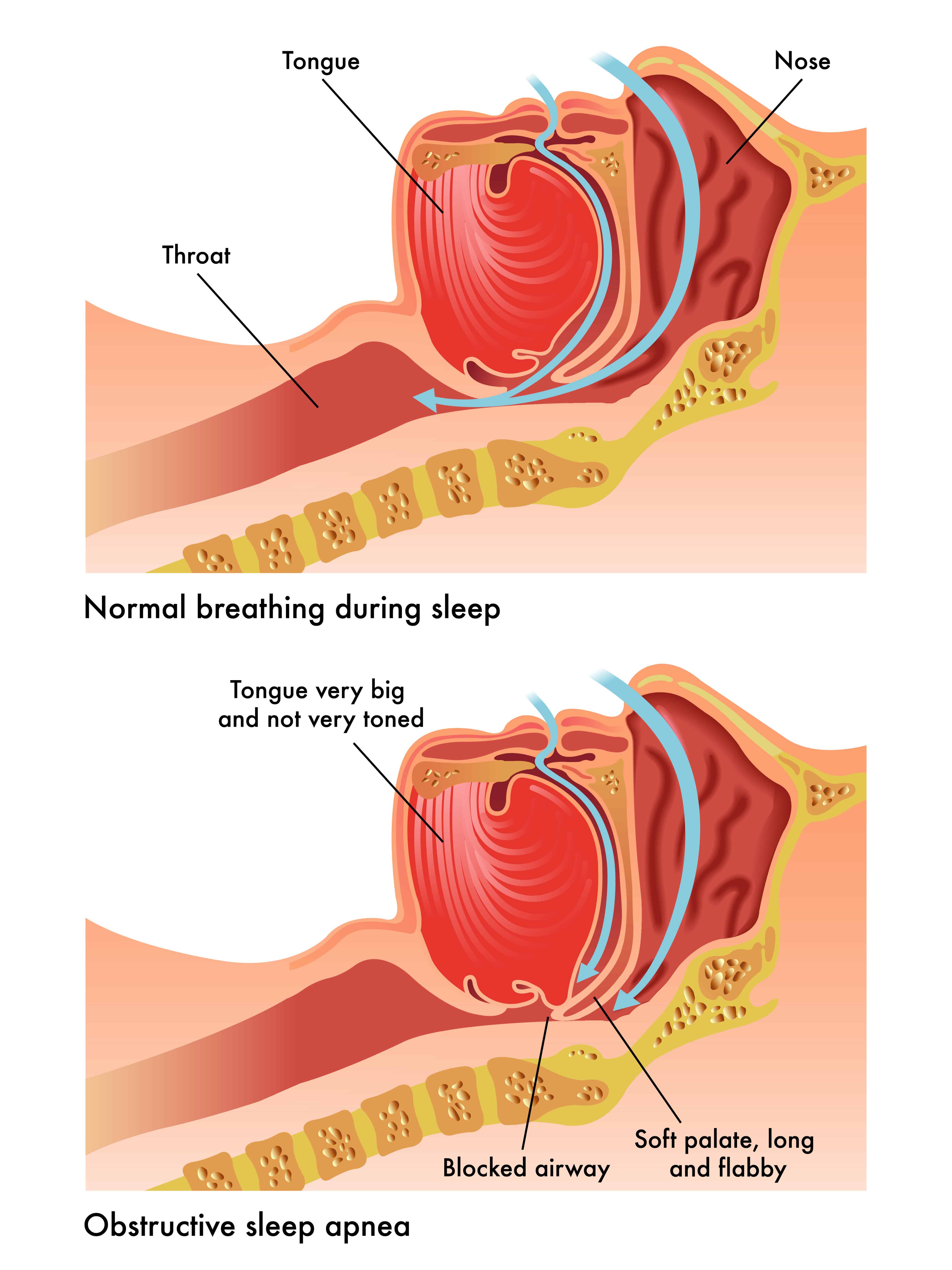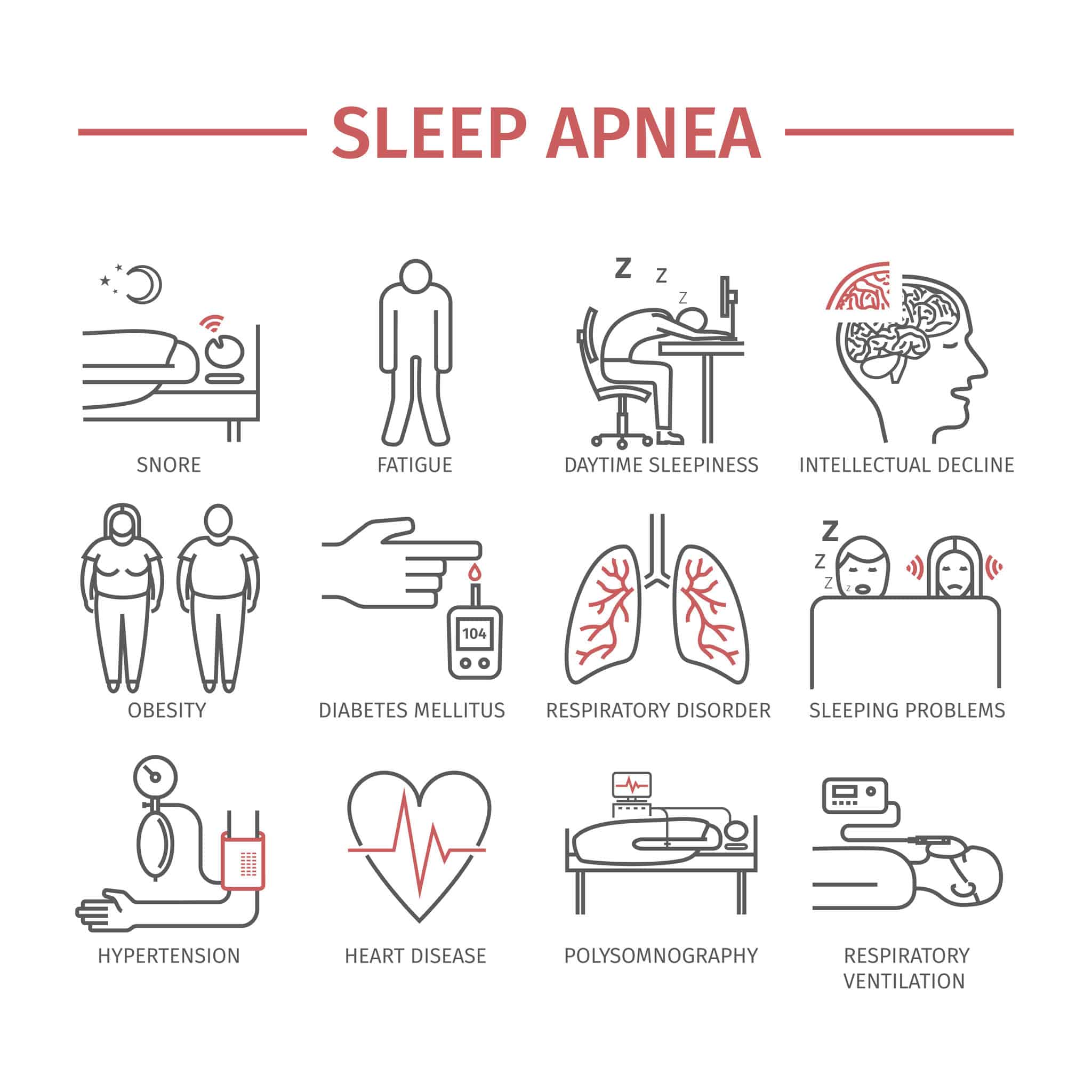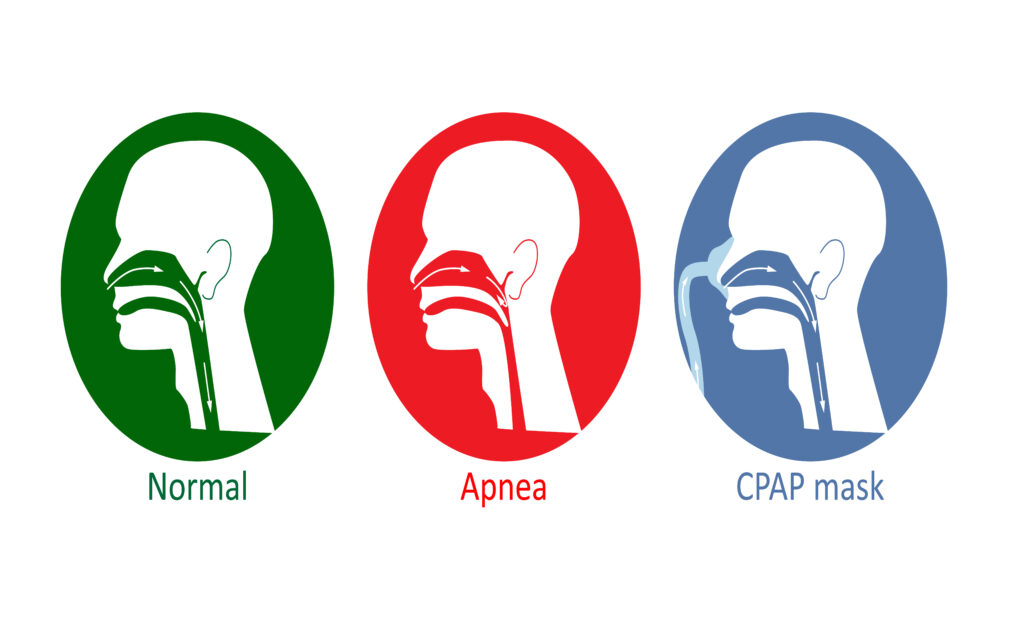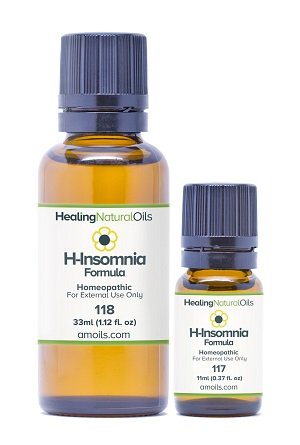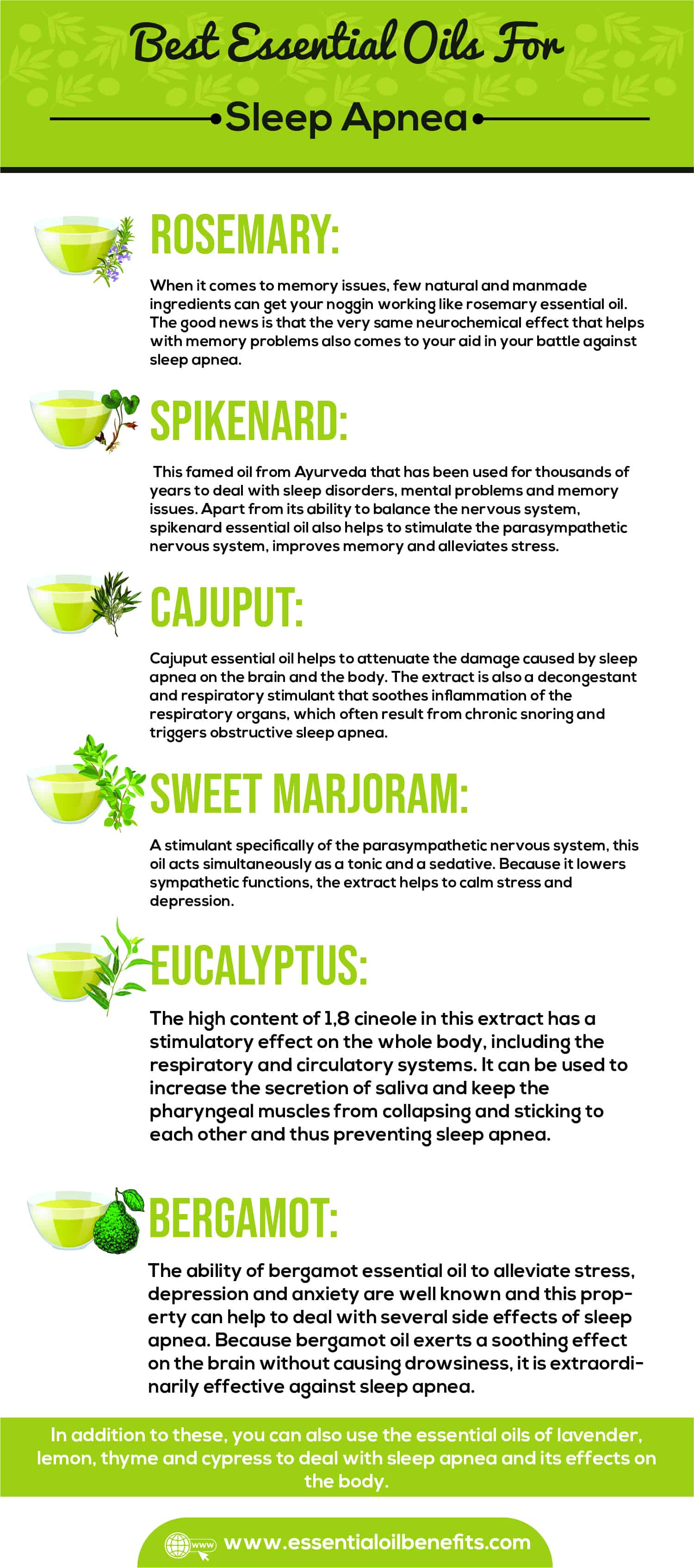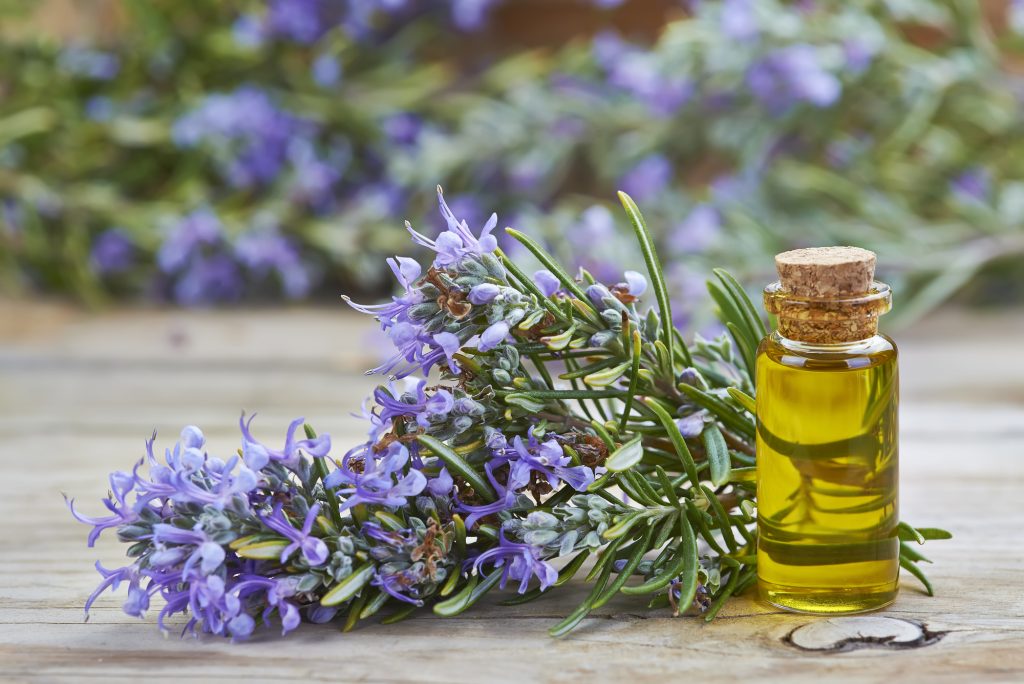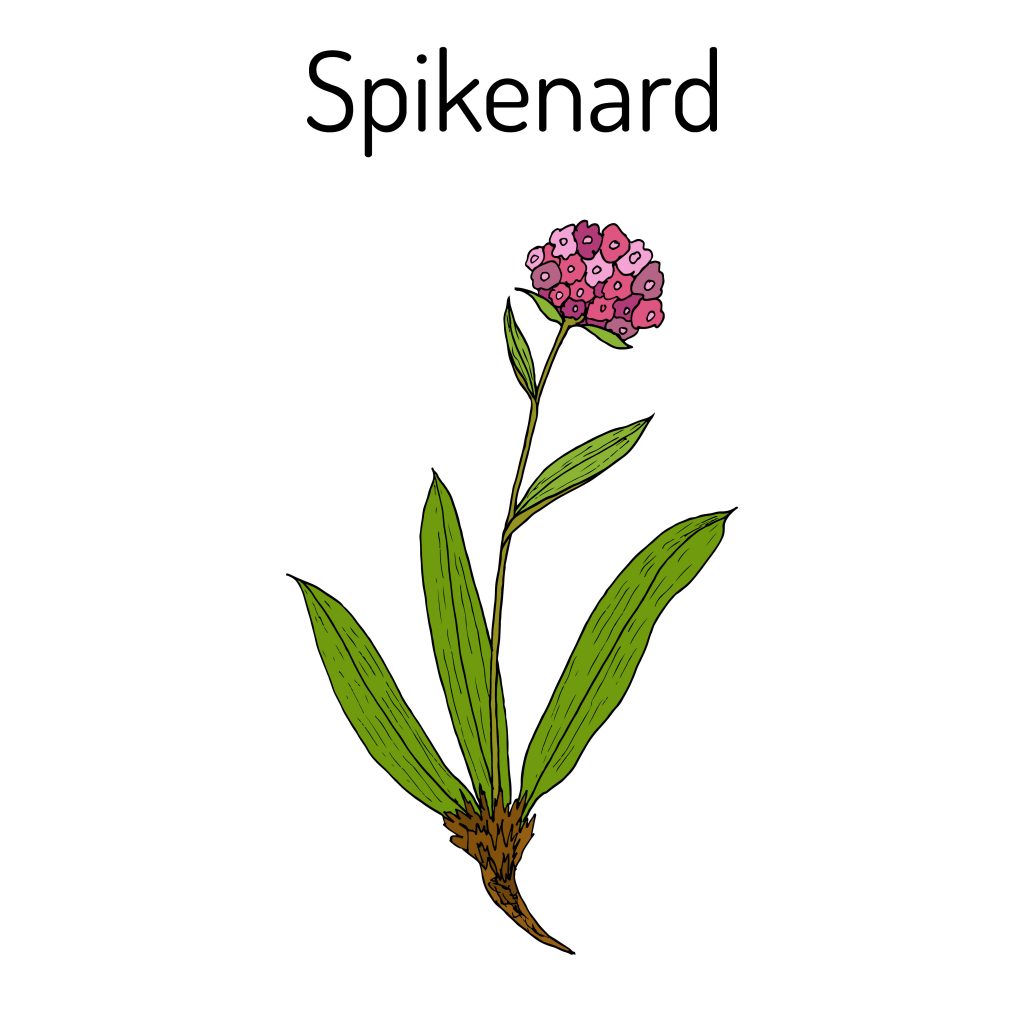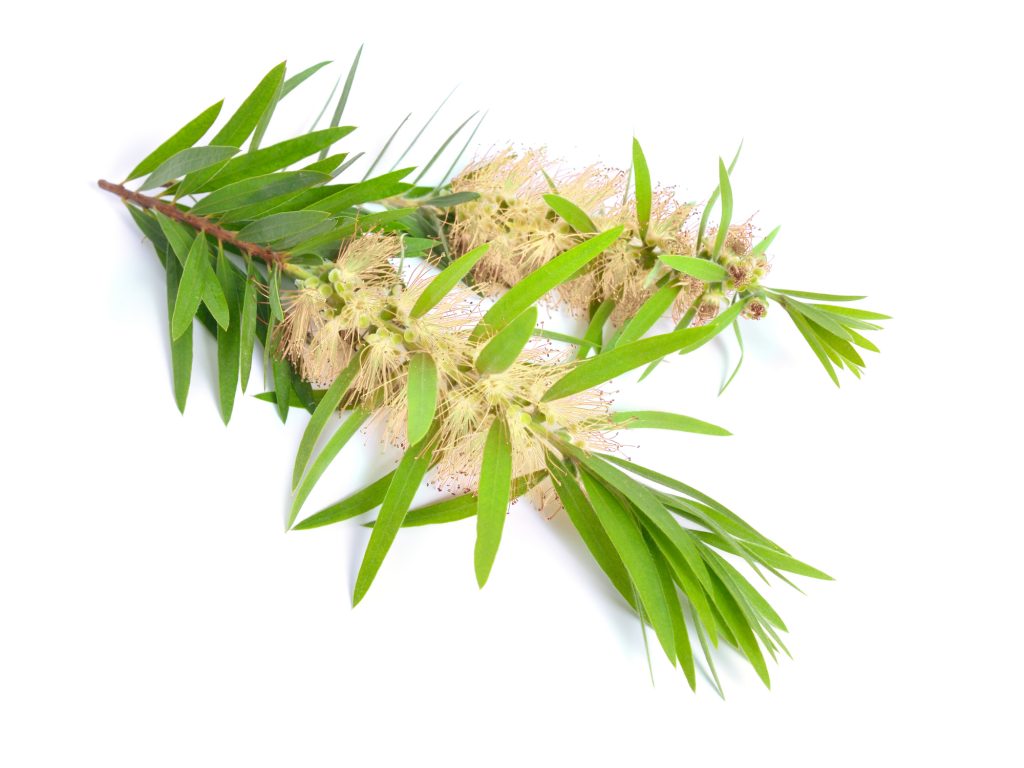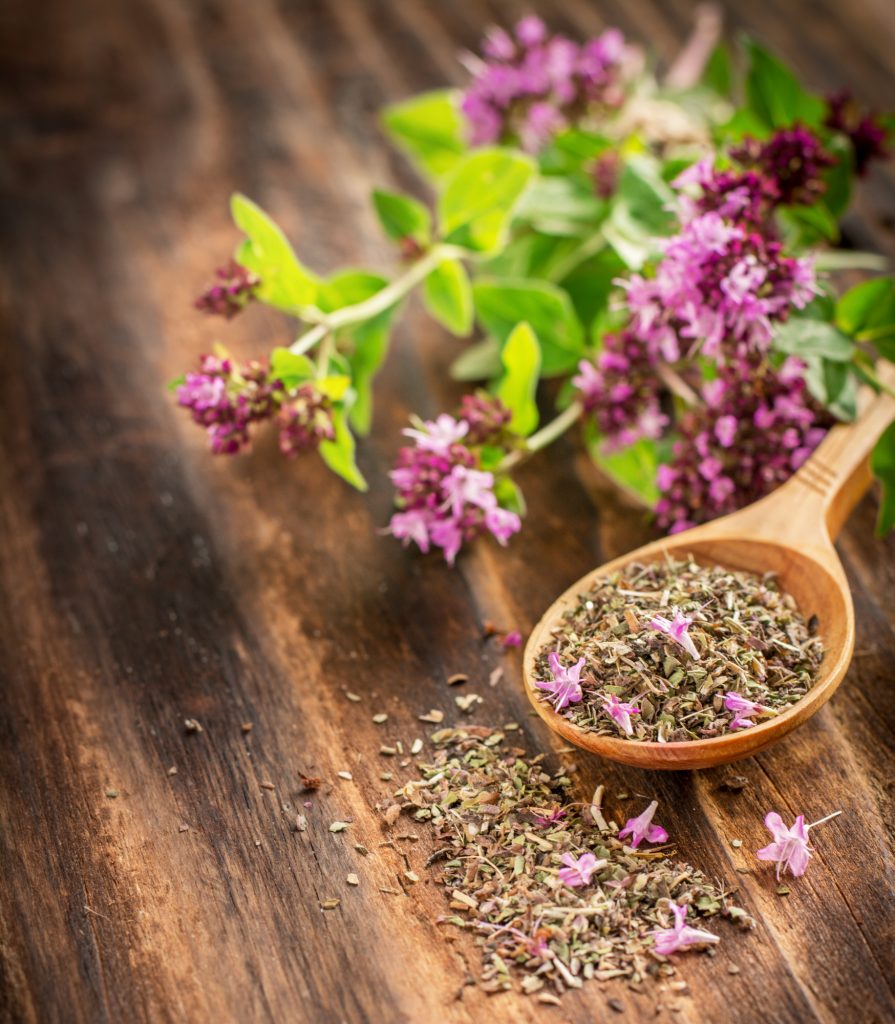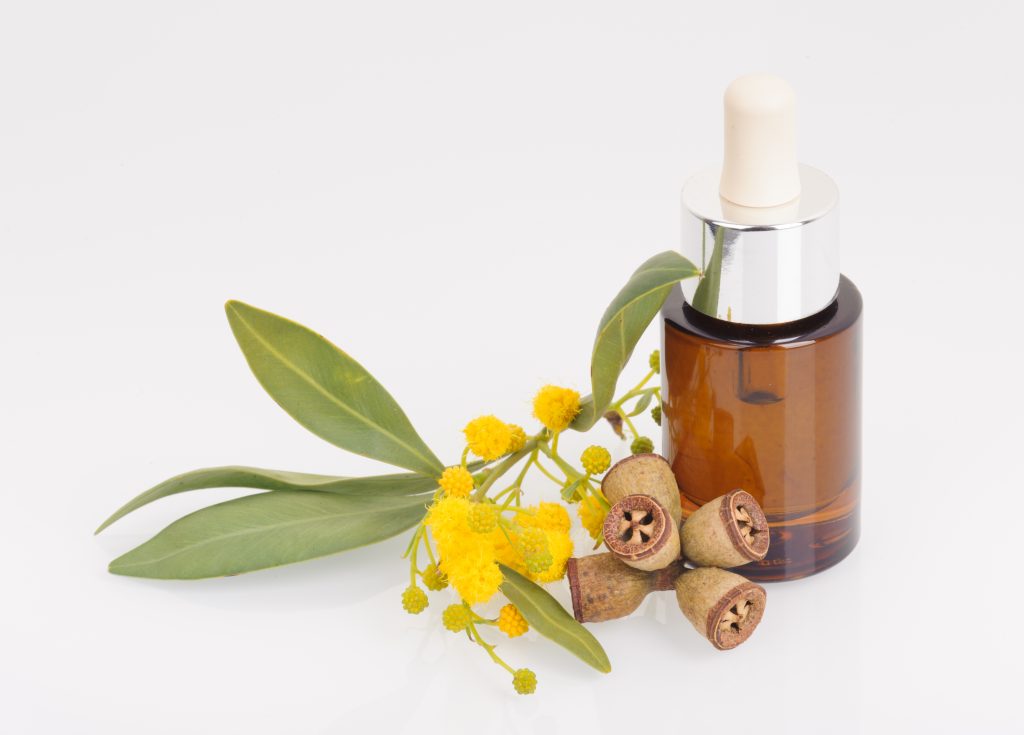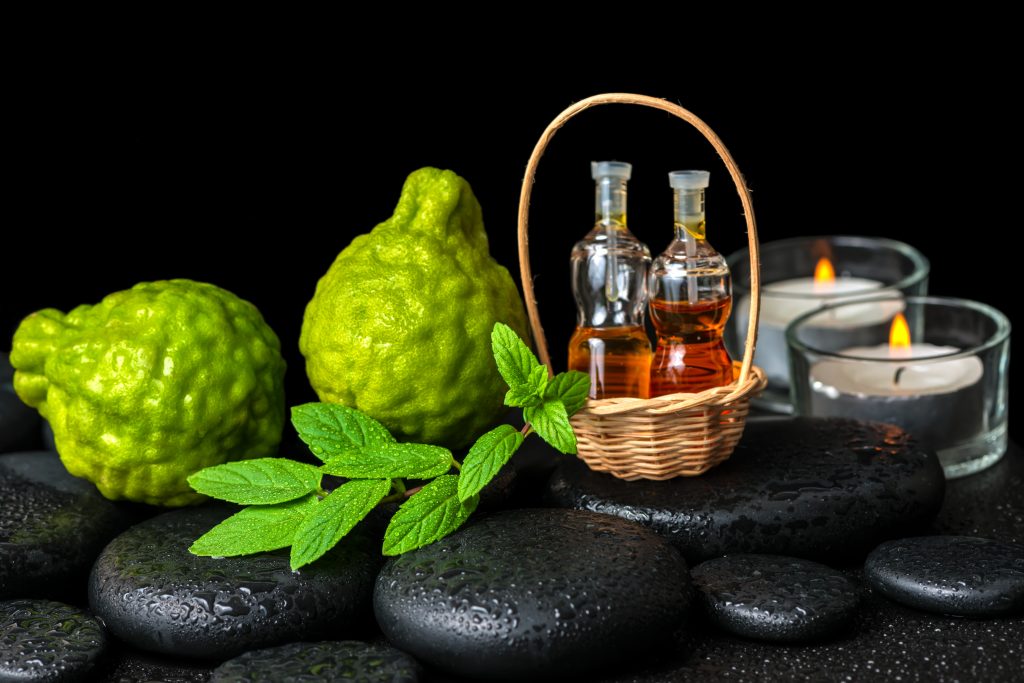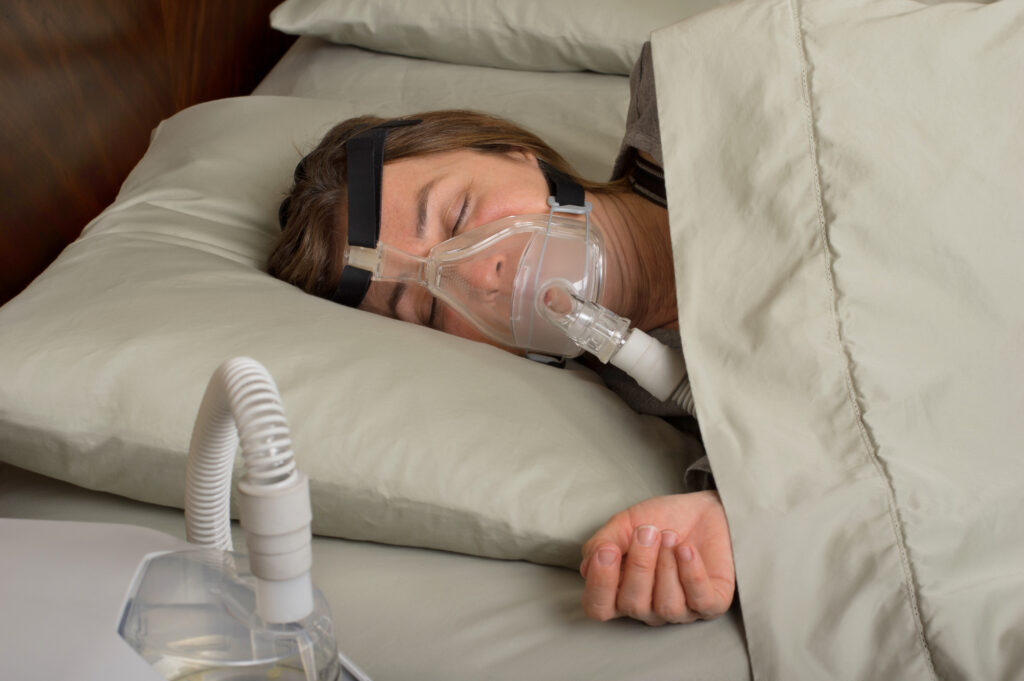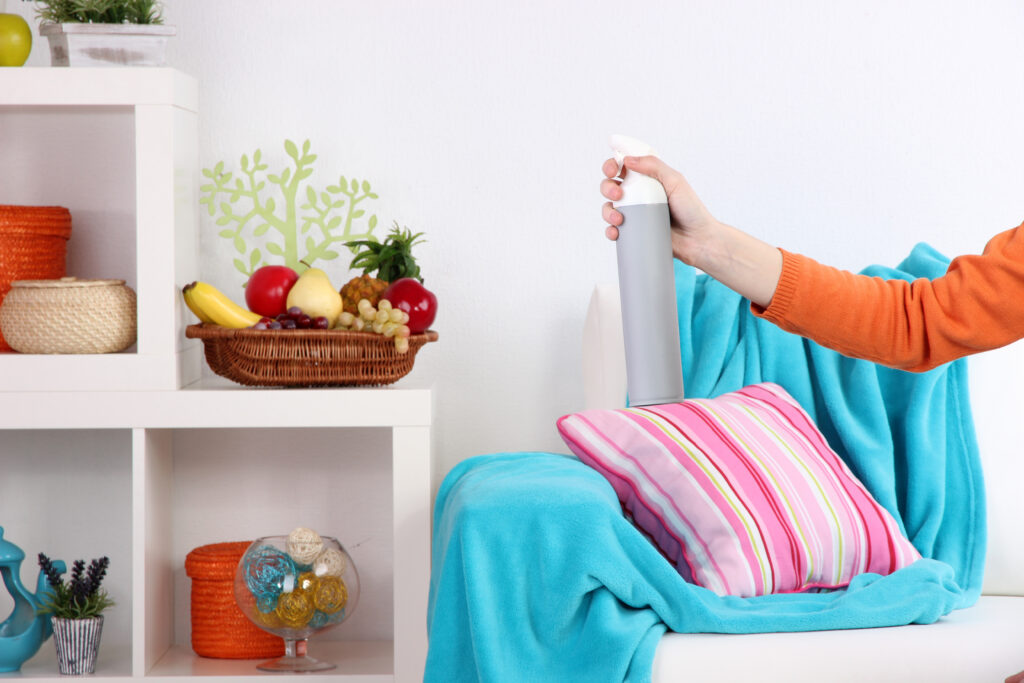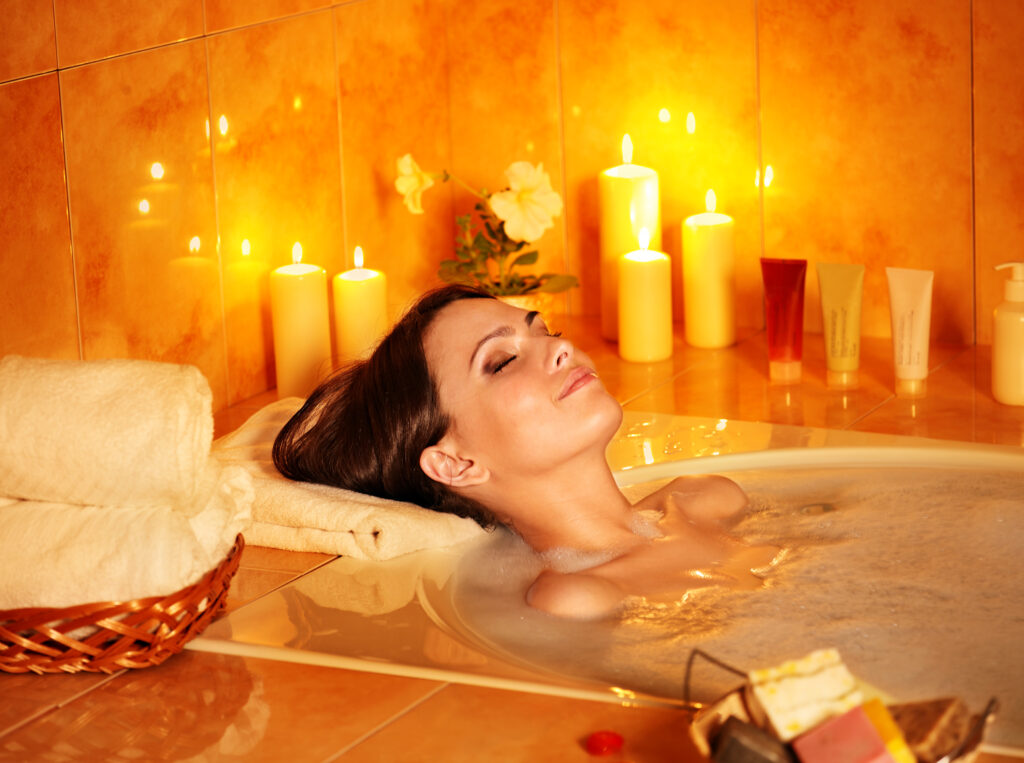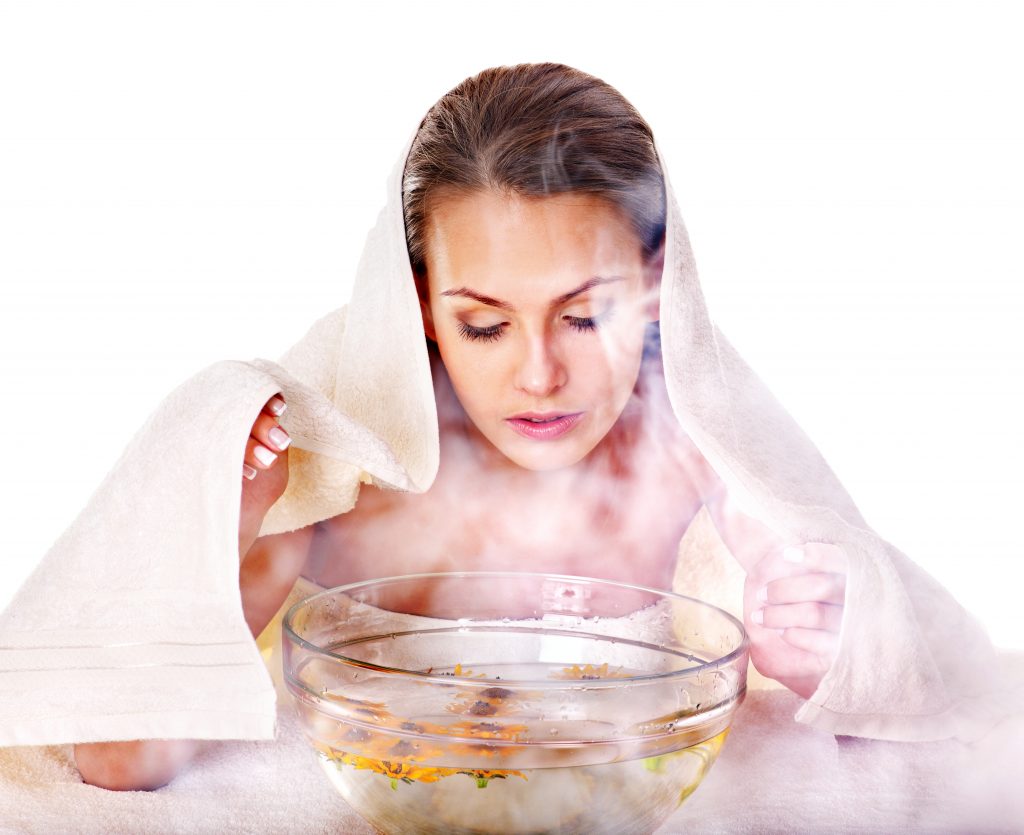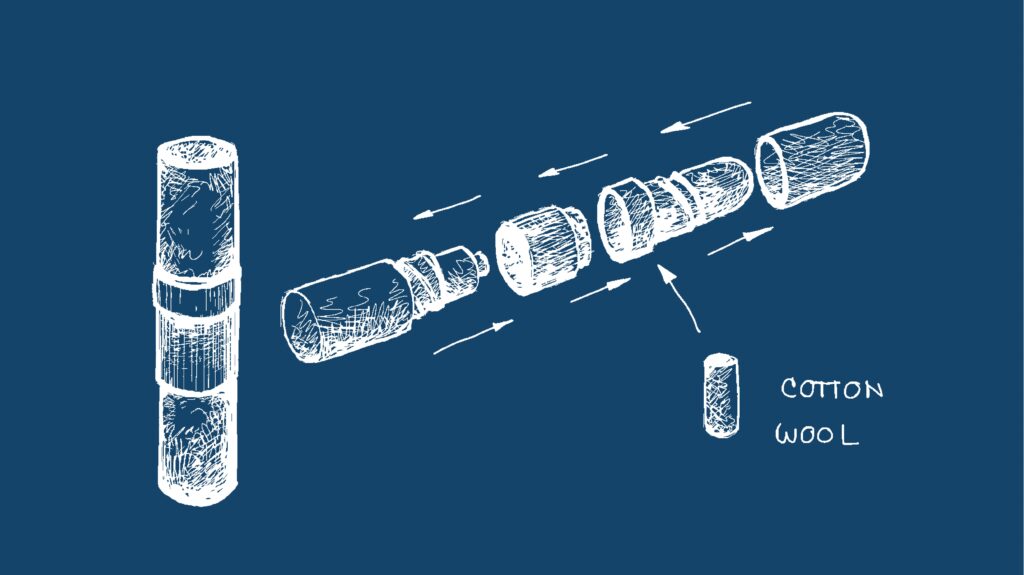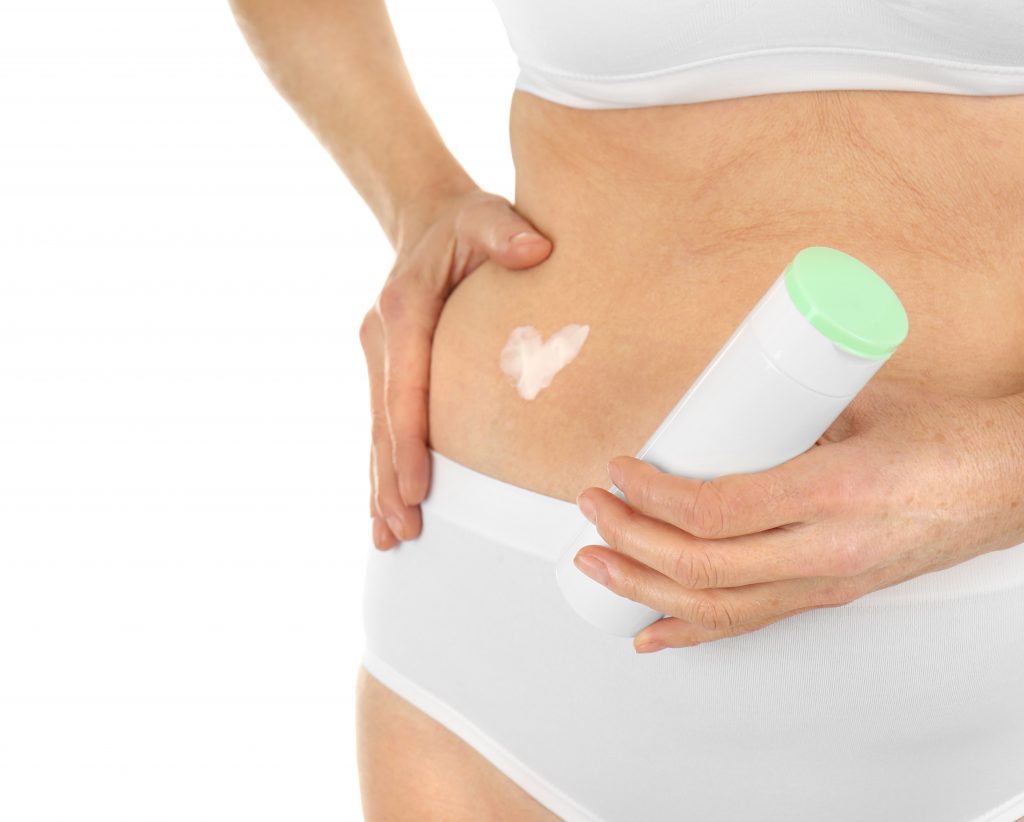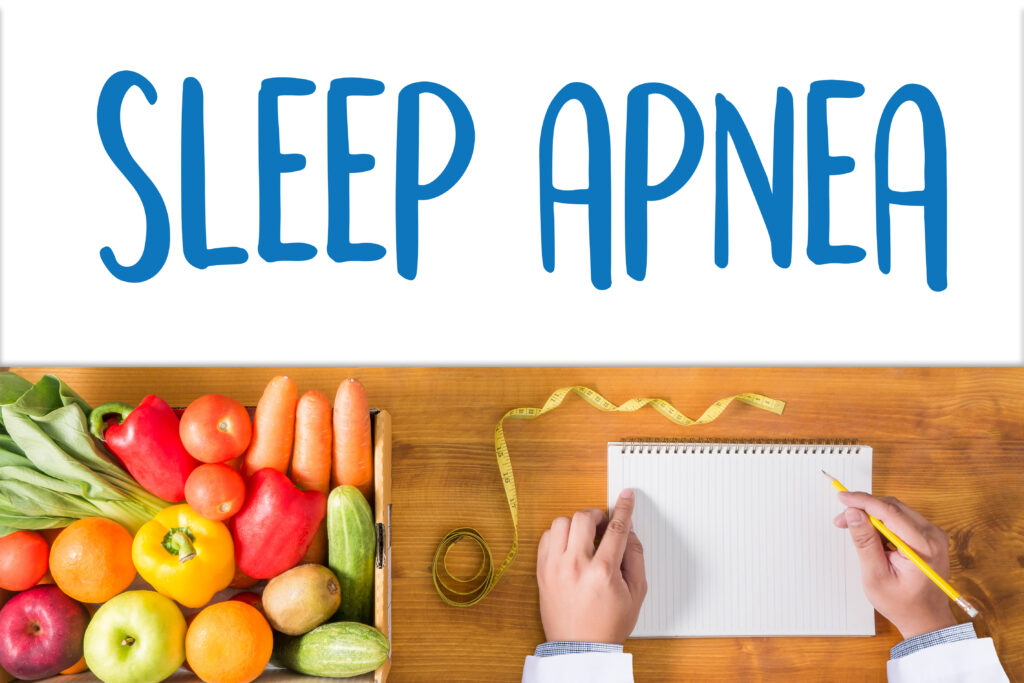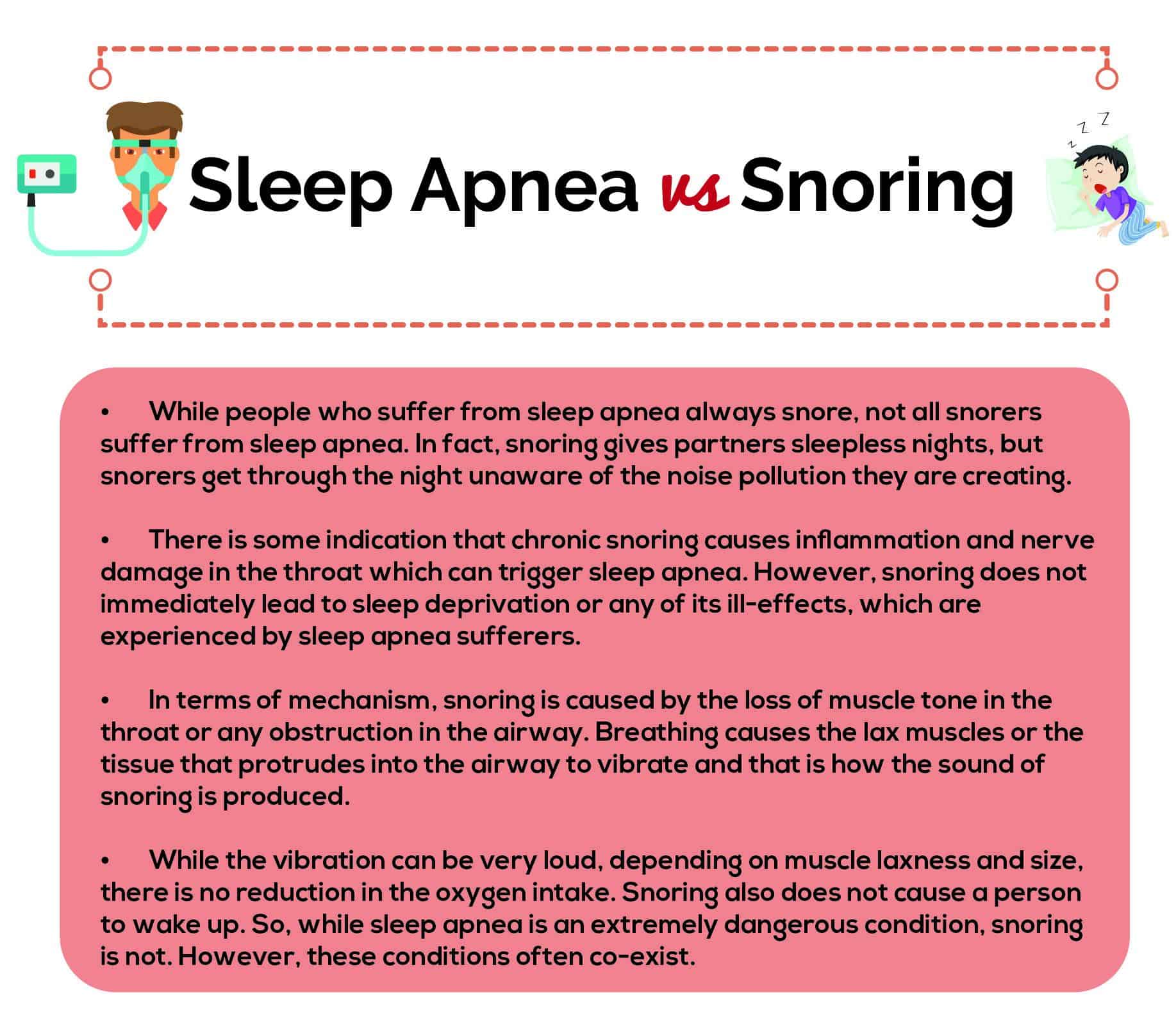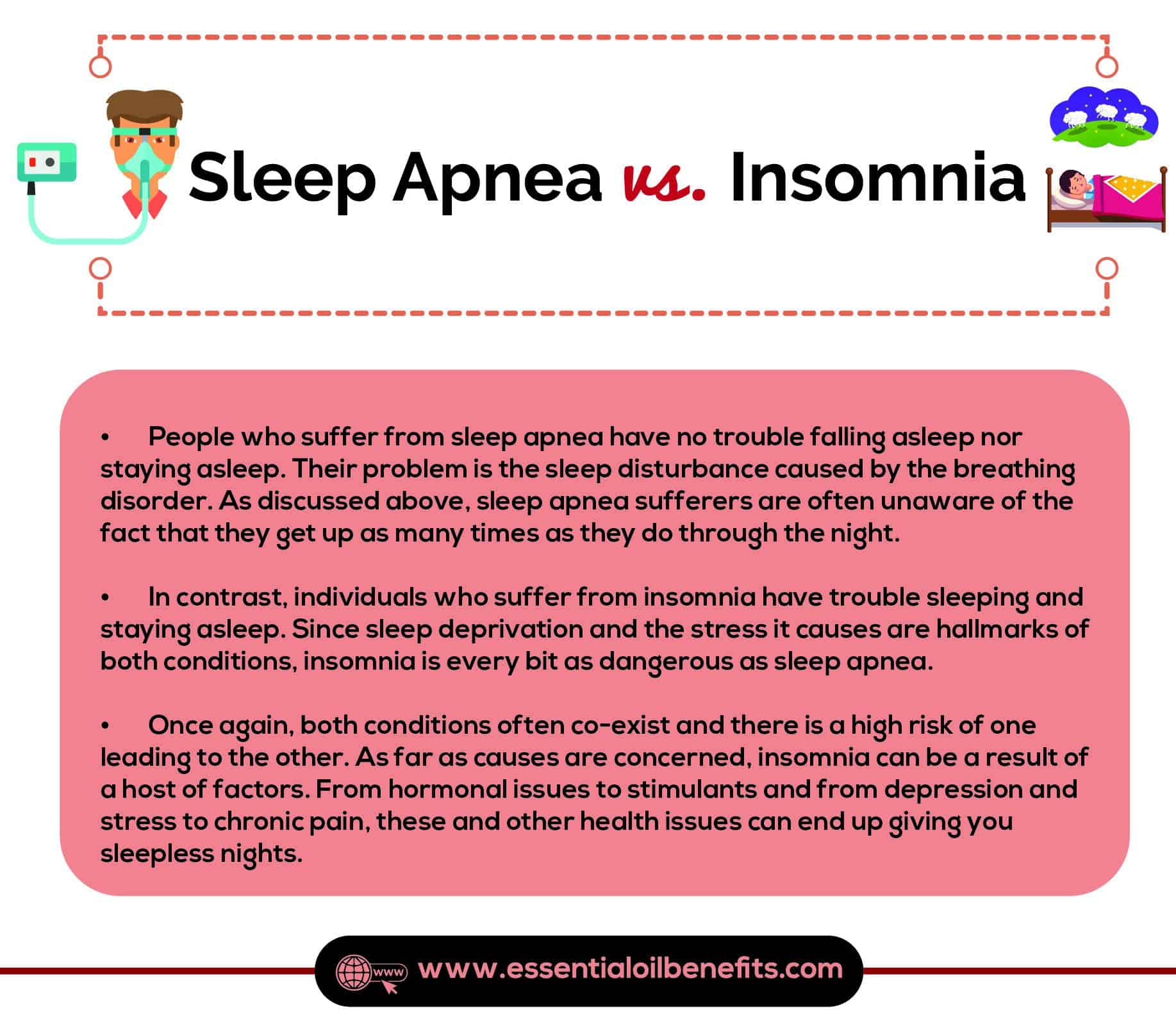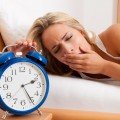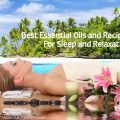Sleep apnea is the silent villain that lurks in your bedroom, waiting to pounce on you the minute you fall asleep. The most dangerous aspect of this sleep disorder is that nearly 80% of the people who suffer from the condition are blissfully unaware of it, hence fail to seek treatment for it in time.
To add to their problems, while they retire into the deceptive lair of the disease each night and wake up groggy but ignorant of what ails them, sleep apnea continues to heap damage on the body and the brain. Unfortunately, these individuals also put themselves in harm’s way as they go about their day.
For example, did you know that the detrimental effects of sleep apnea lead to a 2.5 times higher risk of getting into an automobile crash? If that has not shocked you enough, here are a few more disturbing statistics about sleep apnea that will make you sit up and ponder if your bad mornings are attributed to the condition.
- Nearly 70 million Americans suffer from sleep apnea.
- As many as 7% of all men and 5% of all women battle sleep apnea each night.
- According to the National Commission of Sleep Disorders Research, almost 40,000 people die each year of cardiac complications caused by sleep apnea.
- In adults, the prevalence of sleep apnea is almost 10%, if all diagnosed and undiagnosed cases are accounted for; just as many children suffer from the condition.
- 25% of adults in the age group of 30-70 years live with obstructive sleep apnea.
- The risk of developing the condition increases significantly with age.
A sleep breathing disorder, the impact of sleep apnea can be life altering. In fact, its damaging effects are not just restricted to the person who suffers from the condition but also extend to all those around him/her, particularly partners. So, let us start by talking about…
What Exactly Is Sleep Apnea?
In simple words, it’s a breathing problem that interrupts deep sleep. People who suffer from the condition, can be jolted out of their sleep as many as 30 times in an hour. Because a person only rouses for a few brief seconds, the gagging and gasping for breath does not really register in the conscious mind.
So, you will feel horribly sleep deprived but may not remember a thing about choking for breath every 2 minutes, as you slept. Sleep apnea not only hinders sleep but also causes low blood oxygen levels. So, your brain and body are dealt a double whammy.
The lack of oxygen impacts the heart, the brain and all other major organs in the body while the lack of sleep leads to stress and the generation of free radicals in the body, which cause further damage. So, you are talking about starved cells subjected to antioxidant stress, how do you think they fare?
Now, here is the reflective effect of the problem. While the few seconds of gasping may not wake you to alertness, the jolting and the snoring are likely to cause your partner to get up with a start. In fact, the partners of those who suffer from sleep apnea are known to lose as much as 1 hour of sleep each night. Is it any wonder then that sleep apnea also has a devastating effect on the relationship health of the people who suffer from it?
What Causes Sleep Apnea?
The condition can be a manifestation of a physical anomaly or a neurological problem. Depending on the cause of sleep apnea, the condition is classified into three types:
1. Obstructive sleep apnea
This is literally a physical obstruction caused in the upper airway by collapsing throat/pharyngeal muscles. The most common type of the condition, obstructive sleep apnea (OSA) occurs when the natural relaxation of the tongue and the throat muscles creates an overlap of tissue in the upper airway that completely or partially blocks the flow of air into the lungs.
As a result, the diaphragm and chest muscles have to work harder to pull the air into the lungs. OSA can result from excess tissue in the throat, nose or mouth and enlarged tonsils that may press down on the airway as you lie down flat. The obstructive form of apnea can take on two forms:
- Apnea, which involves a complete block of the airway.
- Hypopnea, which is a partial blocking of the airway that causes a reduction of 50% or more in air intake.
- Respiratory effort related arousal, which is a limitation in breathing that does not qualify as apnea or hypopnea but does lead to arousal.
A thicker than normal neck is a risk factor for developing OSA because of the excess tissue. This explains why men have a higher risk of suffering from the condition than women. In addition, other causes of sleep apnea include:
- Damage to the hypoglossal nerves due to chronic snoring
- Nasal congestion
- Medications
- Smoking
- Being overweight
- Aging
- High blood pressure
- Alcohol
- Family history
- Constricted airway
2. Central sleep apnea
This condition is less common than OSA and is caused due to a lack or reduction in the drive to breathe. Your brain controls the nerves that transmit the signal to the muscles in your throat, nose and lungs to breathe. But when the brain fails to send a strong enough signal, this results in a lower than required breathing drive or a temporary but complete cessation in the breathing drive. Although it is not as common as OSA, it can be more dangerous depending on the cause of the problem. Because this is a brain related issues, CSA is caused by:
- Any injury to the head/brain
- Brain infection
- Strokes
- Spinal injury
- Infection of the spinal cord
- Opioid use
- Progressive damage or degeneration of the cervical spine
- Brainstem lesions
- Brain tumor
- Aging
- Narcotic painkillers
- Severe obesity
- Heart disorders
3. Mixed/Complex sleep apnea
As the name suggests, this is a combination of both the conditions discussed above. Yes, they can co-exist and as expected the damage caused by mixed apnea is often more serious than that caused by any one condition. The causes of complex/mixed sleep apnea remain poorly understood.
The Symptoms Of Sleep Apnea
- Waking up feeling groggy and fuzzy
- Unrestful sleep
- Sore or dry throat in the morning
- Extreme daytime sleepiness
- Difficulty remaining asleep
- Sudden and uncontrolled episodes of dozing off while at work or even when driving
- Loud snoring
- Cognitive deficits
- Slower reaction time
- Distinct deterioration in problem solving and decision-making skills
- Marked reduction in memory retention and recall
- Lack of energy through the day
- Inability to learn new things
- Significant reduction in sex drive
- Irritation
- Palpitation
- Persistent headaches in the morning and/or through the day
- Feeling weak and numb, physically and mentally
Apart from these, CSA can also cause additional symptoms such as:
- Chest pain as you sleep or when you awaken at night
- Shortness of breath when lying down which gets resolved when you sit up
- Abrupt rousing at night with shortness of breath
- Problems with swallowing
- Changes in voice
Regardless of the type of apnea involved, some of the observed symptoms of the condition include:
- Episodes in which there are no signs of breathing in terms of abdominal or chest movement
- Abrupt cessation of breathing followed by choking, snorting or gasping for breath without waking up
- Shallow breathing with intermittent long and short pauses in breathing all together
- Increase in loudness of snoring as the patient falls into deeper sleep
Diagnosing Sleep Apnea
Polysomnagraphy or sleep study is the only way to accurately diagnose the condition. However, you will also be asked to undergo other tests to understand the impact of apnea on your body. So, don’t be surprised if your doctor also prescribes additional tests such as:
- An echocardiogram to study the health of your heart
- A lung function test to ensure that pulmonary issues are not the cause of your breathing troubles
- An MRI of the brain and spine
- Other imaging tests to rule out abnormal growths in the respiratory tracts and nasal cavity
Sleep Apnea Complications
A dangerous condition, sleep apnea deprives you not just of sleep but also of oxygen. When breathing stops momentarily, the brain goes into a state of shock while the heart starts beating faster to make up for the low levels of oxygen and the lungs contract harder to pull in as much air as possible.
Notice how all three organs get extremely worked up every time breathing is paused. Now, imagine what happens to the heart, the brain and the lungs when these episodes are repeated several dozen times every hour. Needless to say, the over exertion causes extreme stress and damage to all vital systems in the body. So, sleep apnea is known to increase the risk of many chronic, acute and life-threatening ailments. For instance, the condition increases the risk by:
- Over 25% for all coronary artery diseases
- Nearly 60% for stroke
- Almost 150% for cardiac arrest
Because sleep and oxygen are important to the brain’s healing and cleaning processes, the lack of these can have disastrous effects on the performance of your noggin. Plus, sleep apnea puts you on an emotional roller coaster. So,
- Around 20-25% of patients live with anxiety and depression
- About 12% are diagnosed with PTSD
Sleep apnea also raises the risk of other psychological issues such as bipolar disease and psychosis. In addition to these, the condition is also known to damage the liver. So, metabolic syndrome, nonalcoholic fatty liver disease and cirrhosis are common in people who suffer from sleep apnea.
Because the lack of sleep causes intense daytime fatigue, the condition understandably takes a toll on the professional and personal life of the people who suffer from it. To add to their woes, less sleep and most vital systems going awry lead to a heightened desire for unhealthy foods, which causes weight gain. Unfortunately, packing in the pounds further intensifies sleep apnea. And if all of that is not enough, the ailment can be as hard on your partner as it is on you.
Do you see how relentless sleep apnea can be in its pursuit to destroy every aspect of your being and life? And that alone should give you enough reason to seek a confirmed diagnosis of the condition as soon as you experience even a few of the symptoms.
So, if grogginess seems to be the norm every morning and you can’t seem to think on your feet or constantly sport a frown on your face, see your doctor at once.
Why And How To Use Essential Oils For Sleep Apnea?
To make CPAP more tolerable: Have you ever seen the oxygen mask used on patients who are on a ventilator? Well, the CPAP mask is no different and might I say no more comfortable. The big difference is that folks on ventilator support are unconscious but you will have to wear the mask and sleep with it on. Essential oils can be used to relax both the body and the mind as they deal with the unusual and unnatural feeling of sleeping with a mask on your face. In fact, the right blend can actually help you to deal with the sleeplessness caused by the device.
To neutralize the side effects of sleep apnea: The lack of oxygen and sleep can cause widespread inflammation and imbalance in the body. Fortunately, essential oils can go a long way in neutralizing the terrible effects of the condition on the brain and the body.
To increase the threshold of arousal: Some of these extracts can help to keep you sleeping longer. When you don’t get aroused easily, your sleep deficit will not be as severe as it would normally be if you suffer from the condition. This simply means that at least you will have one half of the battlefield in control.
For their respiratory analeptic effects: Some essential oils are known for their stimulatory effect on the respiratory system and organs. Anecdotal evidence and a few small studies have shown that these oils can help to prevent or limit the collapse of the throat muscles.
To keep the nasal passage clean: The bioactives in many essential oils are known to help with nasal and sinus congestion. Extracts that melt mucus blockages in the nose and those that deal with allergies can help to keep the respiratory tract clear and make it easier to breathe through the nose.
To keep the lungs in good health: Sleep apnea is just as taxing on the lungs as it is on the rest of the body. But, essential oils can improve lung health, thus helping them to cope with the stress caused by the condition.
The Best Ways To Use Essential Oils For Sleep Apnea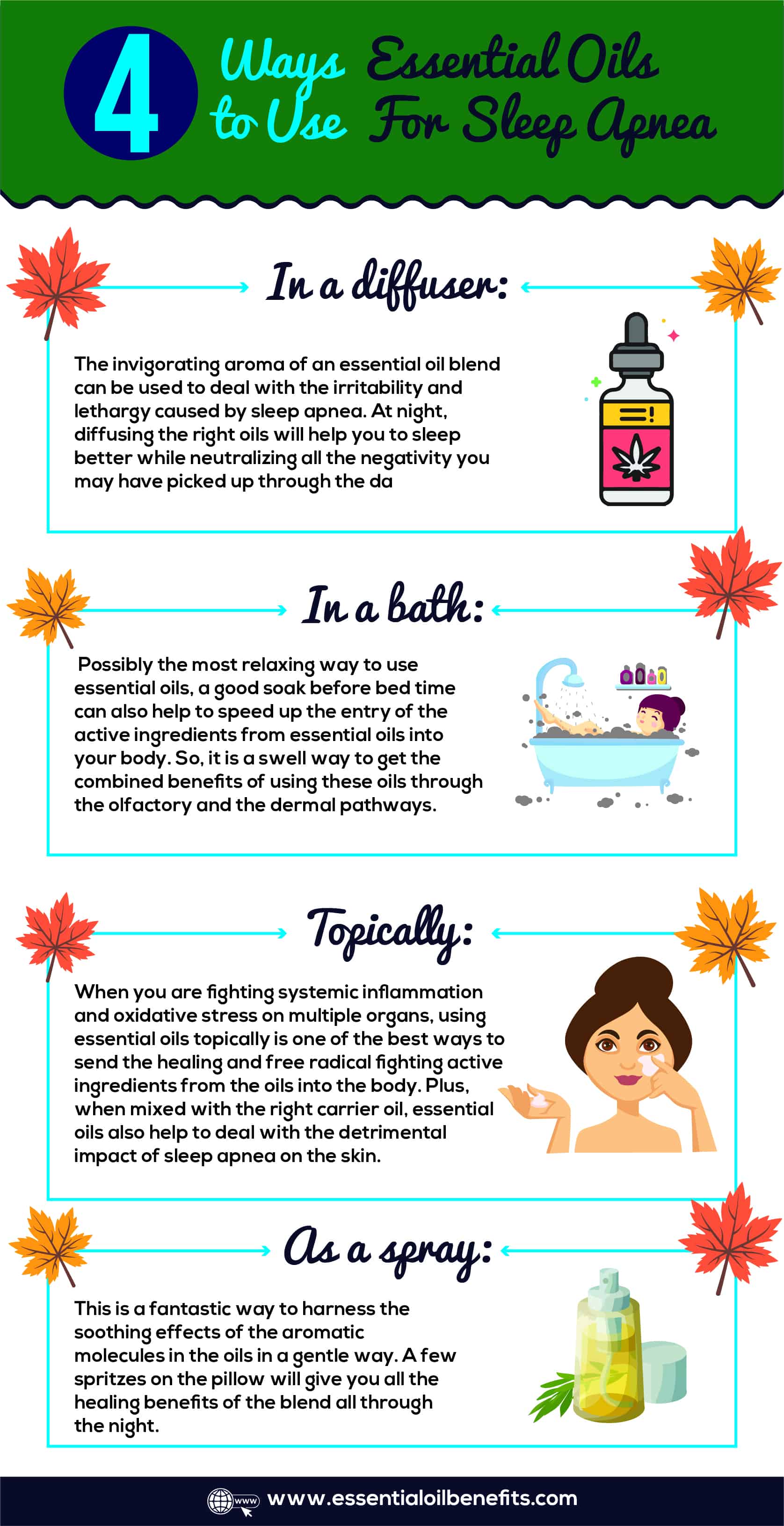
In a diffuser: The invigorating aroma of an essential oil blend can be used to deal with the irritability and lethargy caused by sleep apnea. At night, diffusing the right oils will help you to sleep better while neutralizing all the negativity you may have picked up through the day.
In a bath: Possibly the most relaxing way to use essential oils, a good soak before bed time can also help to speed up the entry of the active ingredients from essential oils into your body. So, it is a fantastic way to get the combined benefits of using these oils through the olfactory and the dermal pathways.
Topically: When you are fighting systemic inflammation and oxidative stress on multiple organs, using essential oil topically is one of the best ways to send the healing and free radical fighting active ingredients from the oils into the body. Plus, when mixed with the right carrier oil, essential oils also help to deal with the detrimental impact of sleep apnea on the skin.
As a spray: This is a fantastic way to harness the soothing effects of the aromatic molecules in the oils in a gentle way. A few spritzes on the pillow will give you all the healing benefits of the blend all through the night.
Recommended Natural Product For Sleep Apnea
If you don’t want to make your own essential oils, you may want to try Amoils H-Insomnia! Click here to read my review on this product.
Best Essential Oils For Sleep Apnea
1. Rosemary
When it comes to memory issues, few natural and manmade ingredients can get your noggin working like rosemary essential oil. The good news is that the very same neurochemical effect that helps with memory problems also comes to your aid in your battle against sleep apnea.
The herb-derived extract is a noteworthy inhibitor of acetylcholinesterase (AChE) and has a direct impact on the parasympathetic nervous system. Together, these benefits help to stimulate the respiratory system and increases salivary output, both of which can help to keep the air flowing through the upper respiratory tract.
2. Spikenard
This is the famed Jatamansi oil from Ayurveda that has been used for thousands of years to deal with sleep disorders, mental problems and memory issues. Apart from its ability to balance the nervous system, spikenard essential oil also helps to stimulate the parasympathetic nervous system, improves memory and alleviates stress.
Its mild sedative properties increase the arousal threshold, which helps to tone down the detrimental effects of sleep deficit. Plus, the oil is a potent antioxidant that helps to deal with the oxidative stress caused by sleep apnea. Jatamansi essential oil is also an effective respiratory stimulant that keeps the respiratory tract clear of mucus congestion.
3. Cajuput
A powerful AChE inhibitor, Cajuput essential oil helps to attenuate the damage caused by sleep apnea on the brain and the body. The extract is also a decongestant and respiratory stimulant that soothes inflammation of the respiratory organs, which often result from chronic snoring and triggers obstructive sleep apnea. Furthermore, the oil is an excellent antioxidant and circulatory agent that helps to alleviate the damage caused by free radicals.
4. Sweet Marjoram
A stimulant specifically of the parasympathetic nervous system, this oil acts simultaneously as a tonic and a sedative. Because it lowers sympathetic functions, the extract helps to calm stress and depression. The warming effect of the oil helps to purge metabolic wastes from the cells and lowers the risk of organ damage and muscle degradation caused by sleep apnea.
5. Eucalyptus
Another oil from the famed Myrtaceae family, the high content of 1,8 cineole in this extract has a stimulatory effect on the whole body, including the respiratory and circulatory systems. Eucalyptus oil is also a powerful mucolytic agent that helps to keep the nasal tract clear of mucus buildup. The stimulatory impact of the oil extends to the brain and the parasympathetic nervous system.
So, it can be used to increase the secretion of saliva and keep the pharyngeal muscles from collapsing and sticking to each other. The distillate also helps to improve memory and focus and to rid the mind and the body of fatigue and lethargy.
6. Bergamot
The ability of bergamot essential oil to alleviate stress, depression and anxiety are well known and this property can help to deal with several side effects of sleep apnea. Moreover, the oil stimulates parasympathetic activity thus boosting salivation and digestion. Because bergamot essential oil exerts a soothing effect on the brain without causing drowsiness, it is extraordinarily effective against sleep apnea.
In addition to these, you can also use the essential oils of lavender, lemon, thyme and cypress to deal with sleep apnea and its effects on the body.
Essential Oil Recipes For Sleep Apnea
1. Diffuser blend for CPAP comfort
Yes, it takes a while to get used to the CPAP device, but this blend can go a long way in helping you to cope with the discomfort and the sleep-impeding effects of the mask. Diffuse half an hour before bed time for about 15-20 minutes. Don’t forget to switch off the diffuser before turning in for the night. For the blend, you will need:
- 10 drops bergamot
- 15 drops lavender
- 8 drops vetiver
Method:
Mix the oils and store in a dark glass bottle. Use 6-8 drops of the blend, preferably in an ultrasonic diffuser.
2. Gargling for comfort
This is a two-step process that will help to work the jaw and throat muscles, so that they don’t close down once you fall asleep. For the blend, you will need:
- 100 ml carrier oil (sesame or olive)
- 2 drops lemon
- 2 drops thyme
Method:
Mix the oils and store in an amber glass bottle. To use start with:
Step 1: About 15 minutes before bed time, hold a pencil/chopstick in between your front teeth for 5-10 minutes or till your jaw starts to hurt.
Step 2: Brush your teeth as you would normally. Then, instead of using a mouthwash, gargle with a mouthful of the blend. Consider this to be a different version of oil pulling. But, you are not supposed to swish the oil in your mouth. The idea is to lubricate the pharyngeal muscles and to give the bioactives in the oil to work on the inflammation and the nerves in the upper respiratory tract. Spit the oil into the garbage bin because the oil will clog the sink.
Make sure that you don’t swallow the oil. Gargle for 1-2 minutes. Take a break in between and breathe through the nose, so you don’t have to spit out the blend. Do not drink water or anything else after gargling; head straight to bed.
3. A soothing spray
You can use this spray along with the diffuser blend or on its own when you are too tired to bother with diffusion. You will need:
- 50 ml water
- 5 drops spikenard
- 2 drops sandalwood
- 3 drops lime
Method:
Mix the oils together and set aside. Pour 50 ml of water into a spritzer bottle and top it off with the oil blend. Give the bottle a vigorous shake and then spray on the bed linen and around your bedroom right before bedtime. If you intend to spend some time in the den with a good book or on the couch watching your favorite show, spray it on the upholstery and pillows in that area.
4. The soothing bath to keep sleep apnea in check
This bath will take away the fatigue of the day and improve circulation while transporting phytocompounds that keep cholinesterase in check, into the body. This is what you will need:
- 1 tsp milk (plant or dairy)
- 5 drops lavender
- 3 drops sweet marjoram
- 2 drops juniper berry
Method:
Mix the oils with the milk and set the blend aside. Run a warm bath and add the oil blend to the bath tub. Disperse the oils by agitating the water and then enjoy the antioxidant and anticholinesterase benefits of the oils for a good 15-20 minutes.
5. Steaming your way clear respiratory tract
If you are often troubled by nasal congestion, dry cough or pulmonary congestion, here is a way to improve the health of the respiratory tract and to eliminate the buildup of mucus. You will need:
- A medium sized bowl filled with hot water (boiling water)
- 1 heaped tbsp. Himalayan pink salt
- 2 drops cajuput
- 1 drop eucalyptus
- 1 drop lavender
Method:
Mix the oils in a small bowl and set the blend aside. Fill a large salad bowl halfway through with boiling water. Add the salt to the water and then the oil blend. Bend your head over the bowl, keeping a distance of 12-14 inches between your skin and the surface of the water. Cover your head with a towel to keep the steam inside. Inhale deeply to clear mucus blocks and to moisturize the respiratory tract.
6. The day-time stress and fatigue relieving inhaler
Keep this inhaler handy if mental fog continues to haunt you through the day and stops you from focusing on your work. You will need:
- 4 drops lime
- 2 drops each rosemary, spikeard and cajuput
- 10 drops carrier oil of your choice
Method:
Mix the oils in a bowl and soak the wick of an essential oil inhaler in the blend. Insert the wick back into the inhaler shell. Carry the inhaler along with you and take a few deep whiffs when you can’t seem to concentrate.
7. The antioxidant body lotion that is great for all of you
This antioxidant blend will help to deal with the oxidative stress caused by sleep apnea. Additionally, the healing effects of this mixture help to heal the skin, the brain and the heart. You will need:
- 30 ml (1 oz.) body lotion/apricot kernel oil
- 5 drops spikenard
- 7 drops grapefruit
- 2 drops clove
- 3 drops cypress
Method:
Mix the oils together and store in a dark glass bottle and use as you would any other body lotion. Use for 3 weeks continuously and then take a break of 1 week.
8 Natural Treatment / Therapies For Sleep Apnea
Here are some additional natural treatments that you can use in conjunction with essential oils.
1. Positional Therapy
This is one of the most effective treatments for sleep apnea, and one that even experts recommend. When you are lying on your back in a supine position, the muscles of your pharynx are more prone to collapsing, which causes both snoring and obstructive apnea.
On the other hand, when you sleep on your side, the throat muscles go back to functioning the way they should and your breathing goes back to being normal. Unfortunately, you are not in control once you doze off. So, you will need a little help to spend the night on your side. A positional therapy device is one way to ensure that you remain on your side.
It’s essentially a small feedback device that you wear around your waist or back. The unit vibrates as soon as you change position to lie on your back and although the vibration isn’t enough to wake you up, it does make you change your position and go back to sleeping on your side.
Another way is to fill a tube sock with 3-4 tennis balls and sew/pin it to the back of your pajamas such that the loaded sock is right behind your waist or lower back. As soon you turn to sleep on your back, the pressure caused by the tennis balls on your spine, will make you shift your position and go back to sleeping on your side.
2. Herbal help
Herbs like valerian root, St. John’s wort can help to increase the arousal threshold and thus reduce the detrimental physical and mental effects of sleep apnea. Tagar (valeriana wallichii), also known as Indian Valerian is an herb that has been used to treat sleep disorders for centuries.
A respiratory stimulant (analeptic) as well as an AChE inhibitor, this herb can prove to be effective against all forms of sleep apnea. Moreover, a few small studies have also proved the efficacy of melatonin and kampo extract in treating obstructive sleep apnea.
3. A hot drink before bed
Instead of your regular infusions, opt for this natural concoction that helps to maintain the tone of the throat muscles. You will need ¼ tsp each of black pepper and cinnamon powder, a glass of warm water and 1-2 tsp raw honey. Mix the spices and the honey with the warm water and enjoy the warm concoction about 15-20 minutes before you retire to your bedroom.
4. Give external support to your lungs and your throat
A vapor balm/rub can help you to breathe easier and keep your sinuses from creating trouble for you. A simple and effective recipe involves blending any plant butter (10 ml) with 5 drops each of rosemary and eucalyptus essential oils. Prepare the blend and store in a roller ball bottle. Apply on your chest, throat and below your nostrils before bed.
5. Wash away the grime from the respiratory tract
A saline wash with a neti pot also helps to prevent mucus buildup in the nose. Plus, the salt water helps to keep the respiratory tracts moisturized and free of allergens. Moreover, the warm water and the salt can also be effective against inflammation.
6. Sleep up to sleep well
Elevating your upper back, neck and head when you sleep is another way to keep the throat muscles from relaxing. Prop yourself against 2-3 pillows such that your upper back, shoulders, neck and head are at least 8-10 inches above the level of your body. Do not elevate only the head because in the long run, this can lead to cervical spondylitis.
7. Singing yourself to better sleep
In one study, it was found that singing tones the throat muscles enough to help with obstructive sleep apnea. Even if you have no intentions of becoming a professional crooner, some amount of vocal training will definitely help as long as you keep doing with the basic exercises you are taught.
8. Exercise those muscles to make them behave
Simple throat, tongue and jaw exercises can greatly improve muscle control, which can help to reduce the severity of sleep apnea. Try these four exercises:
- Hold your tongue flat against your palate for 3 minutes, twice a day.
- Press your palms against your cheeks, exerting inward pressure on the muscles. Now, try to fill your mouth with air and blow your cheeks exerting outward pressure on the muscles that are being pressed inside by your palms.
- Inflate a balloon 3-4 times a day. Inhale through your nose and then exhale through your mouth and into the balloon, pulling your abdomen inside and emptying your lungs of all the air in them.
- Hold your tongue in between your front teeth (don’t bite down on it hard). Now, swallow five times with your tongue held between your teeth. Let go of your tongue and let it rest for 10 seconds then repeat. Repeat five times a day.
5 Lifestyle Changes To Help With Sleep Apnea
1. Get your weight under control to get better control on your throat muscles
If you are sporting a few extra pounds, they will not just add to the girth of your neck but also increase the fat deposits in and around the throat, which makes the pharyngeal muscles more prone to collapsing on each other as you sleep.
Plus, let us not forget how all that lard impacts your heart and the other vital organs in the body. When you combine the terrible effects of sleep apnea and obesity, you get a life threatening situation. So, stop your weight gain from intensifying your sleep apnea or triggering the condition.
2. Let go of your vices
The toxins in cigarette smoke can cause significant inflammation of the throat muscles and of course severe damage to the lungs and the respiratory tract in general. Plus, the smoke is also known to cause fluid retention in the upper airway, which can turn into a respiratory obstruction. The use of alcohol, particularly at night, or any narcotic substance relaxes the throat muscles to the point of impacting their function and causing an impediment to the passage of air.
3. Therapy can come to your aid
Cognitive behavioral therapy can be used to help you to comply with CPAP treatment as well as to deal with some of the mental and emotional effects of sleep apnea.
4. Yoga and workout always help
Whether it’s stress relief, weight loss or stimulating the nervous system, yoga and a good workout can do it all. Plus, it will help you to keep your weight in check. Together, these benefits can go a long way in keeping sleep apnea out of your life or at least reining in the condition.
5. Maintain good sleep hygiene
Sleeping at the same time each night and getting your 8 hours in bed is one of the easiest ways to deal with sleep apnea. Avoid a heavy meal right before bed time and caffeine at least 4-5 hours before you sleep.
Sleep Apnea vs. Snoring
While people who suffer from sleep apnea always snore, not all snorers suffer from sleep apnea. In fact, snoring gives partners sleepless nights, but snorers get through the night unaware of the noise pollution they are creating.
There is some indication that chronic snoring causes inflammation and nerve damage in the throat which can trigger sleep apnea. However, snoring does not immediately lead to sleep deprivation or any of its ill-effects, which are experienced by sleep apnea sufferers.
In terms of mechanism, snoring is caused by the loss of muscle tone in the throat or any obstruction in the airway. Breathing causes the lax muscles or the tissue that protrudes into the airway to vibrate and that is how the sound of snoring is produced.
While the vibration can be very loud, depending on muscle laxness and size, there is no reduction in the oxygen intake. Snoring also does not cause a person to wake up. So, while sleep apnea is an extremely dangerous condition, snoring is not. However, these conditions often co-exist. Hence, it is important to see an expert if you suffer from snoring as well as symptoms of sleep deprivation.
Sleep Apnea vs. Insomnia
People who suffer from sleep apnea have no trouble falling asleep nor staying asleep. Their problem is the sleep disturbance caused by the breathing disorder. As discussed above, sleep apnea sufferers are often unaware of the fact that they get up as many times as they do through the night.
In contrast, individuals who suffer from insomnia have trouble sleeping and staying asleep. Since sleep deprivation and the stress it causes are hallmarks of both conditions, insomnia is every bit as dangerous as sleep apnea.
Once again, both conditions often co-exist and there is a high risk of one leading to the other. As far as causes are concerned, insomnia can be a result of a host of factors. From hormonal issues to stimulants and from depression and stress to chronic pain, these and other health issues can end up giving you sleepless nights.
The Bottom Line
Sleeping well is crucial for both your emotional and physical well-being. Unfortunately, even a slight loss of sleep can take a toll on your efficiency, energy, mood and ability to deal with stress. Overlooking problems like sleep apnea can bring about relationship stress, poor job performance, accidents and impaired overall health. If you wish to stay healthy and be at your best throughout the day, consider sleep as a necessity, not a luxury.
